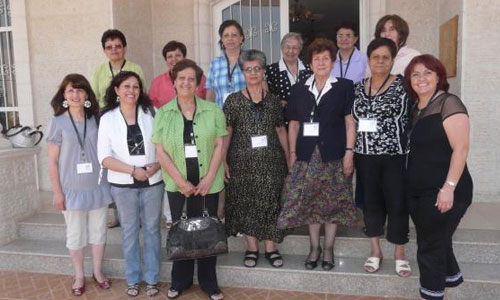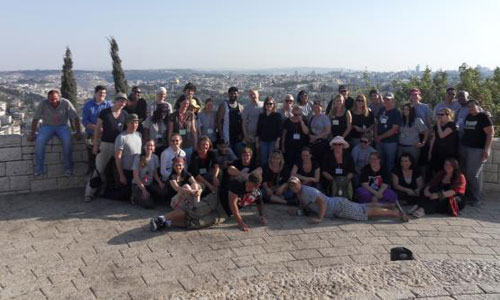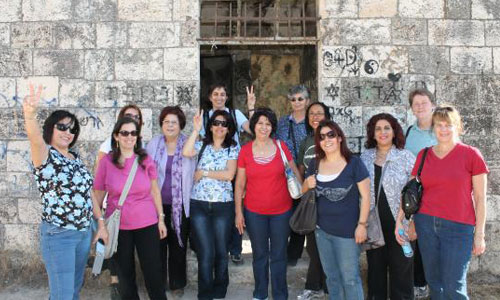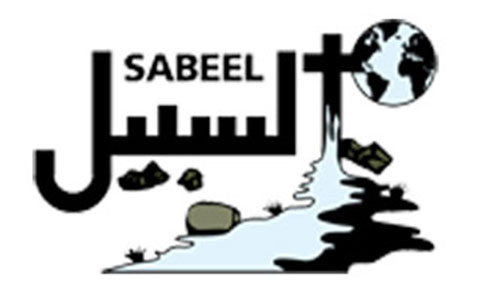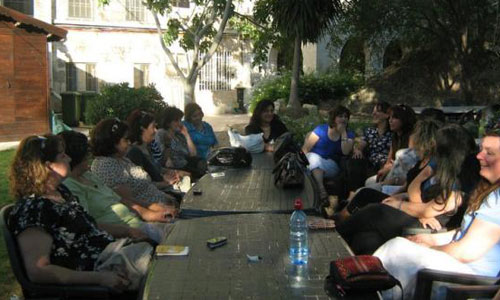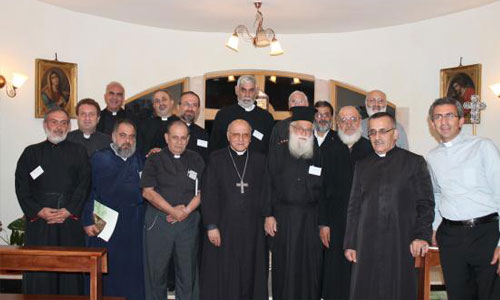
Oct. 9-11, 2011
Mar Ephraim Guest House, Taybeh
“Put on the full armor of God, so that you can take your stand against the devil’s schemes. For our struggle is not against flesh and blood, but against the rulers, against the authorities, against the powers of this dark world and against the spiritual forces of evil in the heavenly realms.”
Ephesians 6:11-12
The Annual Ecumenical Clergy Retreat was held in Taybeh from Oct. 9-11, 2011 at the Mar Ephraim Guest House. Eighteen clergy from different church denominations attended. Clergy members came from parishes in the Galilee, Bethlehem area, Ramallah, Birzeit, Taybeh and Jerusalem. Additionally, Patriarch Michael Sabbah attended the first day of the retreat.
Reverend Naim Ateek, founder and director of Sabeel, opened the retreat with a prayer and gave introductory remarks about the three-day program.
Father Jamal Khader, the Roman Catholic priest, gave a session on the Kairos Palestine document: two years after its declaration. He gave a full report on how the Kairos document has been used all over the world, naming areas such as Holland, England, and the United States. He challenged the retreat participants to maintain the ecumenical spirit that the document reflects. Importantly, Fr. Khader also mentioned that the Palestinian Authority has adopted the spirit of the document.
The clergy from Galilee asked why the document does not reflect their concerns. The response they received was that the Kairos document focused primarily on the Israeli occupation. Recognizing that the occupation is not the primary issue for people in the Galilee—rather issues of equality and identity formation dominate—perhaps there needs to be a Kairos declaration written for the Galilee.
Recommendations regarding the Kairos document:
1. To be given to our Muslim brothers and sisters in the region
2. To be translated to Hebrew
3. To have special sessions on the document in the different villages
4. To use the different Christian websites to spread it
5. To be distributed widely in the churches
The day ended with a prayer led by Fr. George Shahwan, from Beit Jala, according to the Orthodox tradition.
The second day, Oct. 10, 2011, Rev. Ibrahim Simaan from the Baptist church in Nazareth led the morning prayer and devotional. Reverend Naim Ateek then introduced the second session. He focused on “Jesus and Cesar,” and led a reflection on Mathew 5:1-20. After introducing the text and sharing various interpretations, the clergy worked with the text in working groups. Each group had discussion, guided by few discussion questions provided for them by Sabeel.
Miss Gloria Nasser introduced the third session. As an educator from Bethlehem, she spoke about “The future challenges of the clergy.” She presented a film in which she interviewed young people about what they expect from clergy and church administration. One of the things that many young people mentioned was that they would like church leaders to stand up for the truth and Human -Rights especially in the political sphere. Also they do not like to see clergy who are materialistic—for example driving expensive cars—rather they would like to see the priest have a humble economic status. An interesting discussion took place after seeing the film. The clergy agreed with some of the youth concerns, and affirmed their desire to see true servants of God rather than simply servants of the Church.
The final session of the second day (the forth session) was on “Betahone (security) Israel’s Alternative God” given by Rev. Naim Ateek . He introduced the subject, then gave the participants more time for discussion in small groups. They reflected on key Biblical passages from the Old Testament (for example, Numbers 33:50-56, Deuteronomy 20:16-18, and Ezekiel 47:21-23, and Psalm 87:1-7), and used the discussion questions provided.
The day ended with an evening prayer led by Fr. George Daaboub from the Roman Catholic Church in a village near Beit Jala called Irtas.
The third day started with a morning prayer led by Fr. Suheil Khoury from the Melkite church in Ikrit, one of the depopulated villages in Galilee. The fifth session was introduced by Rev. Naim on the “Spirituality of Nonviolence,” based on the ten nonviolence points that Fr. John Dear presented at the 8th Sabeel International Conference (Bethlehem in November 2010).
The sixth session was an open discussion about “The Impact of the Clergy Program.” Sawsan Bitar, coordinator of Sabeel’s clergy program, and Rev. Naim explained the difficulties and the challenges that are facing the program. They asked the clergy to be honest with them. Clergy showed appreciation to the role that Sabeel is playing toward the ecumenical work, saying that what they found in Sabeel meetings they will not find in any other gathering. The retreat participants asked Sabeel to hold more such programs and specifically to work more in Galilee.
Fr. John Dear Ten nonviolence Points (arabic)


